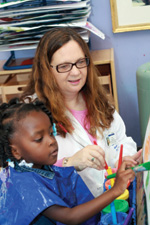|
Rita Ryan, M.D., became
MUSC's new chair of the Department of Pediatrics July 1, coming from
the Women & Children's Hospital of Buffalo, State University of New
York (SUNY) where she served as chief of the Division of Neonatology,
director of the Neonatal-Perinatal Medicine Fellowship Program and
director of the center for Developmental Biology of the Lung.
Born in Tennessee and
raised in the Bronx in New York City, Ryan received her bachelor's
degree in mathematical science from The Johns Hopkins University. She
completed her medical degree and pediatrics residency from SUNY –
Upstate Medical Center in Syracuse and a fellowship in
neonatal-perinatal medicine at the University of Cincinnati-Cincinnati
Children's Hospital Medical Center.
She has an extensive
research background and is principal investigator of the National
Heart, Lung and Blood Institute (NHLBI)-funded Prematurity and
Respiratory Outcomes Program and site principal investigator of the
NHLBI-funded Trial of Late Surfactant.
What attracted you to MUSC?
Strong pediatric
academic program and quality of faculty all on one campus, and the very
strong relationship between the hospital and the academic departments.
 Dr.
Rita Ryan enjoys an artistic moment with Kaylee Edwards, 3. Dr.
Rita Ryan enjoys an artistic moment with Kaylee Edwards, 3.
As chair of the Department of Pediatrics,
where do you see MUSC heading?
We have several areas
in which we have just recruited faculty, including pediatric
hematology-oncology and pediatric endocrinology, and we are planning to
recruit in pediatric pulmonology, genetics and child abuse. We
will be recruiting for academic faculty whenever possible. I hope that
our department will continue to grow in doing research and continue to
have a strong pediatric residency program and fellowship programs in
neonatology, pediatric cardiology, general academic pediatrics,
rheumatology, developmental-behavioral pediatrics, pediatric emergency
medicine and pediatric hematology-oncology.
What research are you excited about?
I am a lung
researcher—I am particularly interested in the effects of high oxygen
levels and how this can hurt the lung and lead to a disease called
bronchopulmonary dysplasia, a chronic lung disease of premature
babies. I am also interested in some of the research done in our
department that involves how to protect the neonatal brain from injury,
and what are the effects of a low vitamin D level in pregnant
mothers. There are some really terrific MUSC research projects
about which I am learning, both within and outside of the Department of
Pediatrics, and I look forward to hearing about every one.
As the mother of three, how do you balance
your professional and personal life?
I have a wonderful
spouse and that really helps. This year is especially hard for me
because my family has remained in the Buffalo area due to my middle
child, Conor, 17, being a rising senior. My daughter Brenna, 15,
will be a high school sophomore. My oldest, Liam, 19, is coming to
visit so I am very much looking forward to that.
 Ryan with
her family: Brenna, Liam, husband Gary and Conor Sleggs. Ryan with
her family: Brenna, Liam, husband Gary and Conor Sleggs.
What are your proudest accomplishments?
Well what
self-respecting pediatrician wouldn't answer this way: my three
children, of course. But if you mean professionally, I would have
to say developing a strong neonatal resuscitation research group in
Buffalo, very much a collaborative effort, but something that is really
making a contribution to how we think about neonatal resuscitation. Any
time any one of my former fellows or faculty has a success, that is
something about which I feel very good.
Do you have a favorite anecdote that
captures a moment for you - where you felt you really were making a
difference?
There is nothing more
fun for a neonatologist than going to the "DR" (the delivery room),
seeing a baby who is not breathing, or having some kind of problem, and
intervening to help them breathe better.
My biggest clinical
successes have probably been later on in my career, playing more of an
overseer role as the attending physician-neonatologist and seeing a
more long-term treatment work for a baby. I remember a baby from
many years ago whose lungs had been hurt from our ventilators, and
oxygen, and from just being so premature, and because this baby had had
so many periods of hypoxia, or low oxygen, the previous team was
thinking of just letting go and not really aggressively trying to
continue intensive care. So I looked at the baby and she seemed
normal from a neurologic, or brain, standpoint. I got an EEG, a
brain wave test, which was normal, and she had not had any bleeding in
the brain problems so common in premature infants, so I did not think
we should not be aggressive just because of bad lungs.
The lung has an
amazing ability to repair itself, if given enough time. She
ultimately had a tracheostomy for home ventilation, and I lost track of
her until my pediatric pulmonary colleague showed me a series of
Christmas cards from her family – all grown up and doing OK (getting a
little extra help in school). There was a similar situation in which
another little baby girl, ex-premie with bad lungs, was thought to be
beyond saving who I started to care for and who also made it and walked
back into the unit at 18 months of age, quite short but otherwise doing
pretty well. Patients like these two reinforce that hope is an
important part of being a clinician.
What are your hobbies?
I play the guitar, read.
What's your favorite quote or mantra in life?
"Once I was sad because
I had no shoes, then I met a man who had no feet."
|



 Dr.
Rita Ryan enjoys an artistic moment with Kaylee Edwards, 3.
Dr.
Rita Ryan enjoys an artistic moment with Kaylee Edwards, 3.  Ryan with
her family: Brenna, Liam, husband Gary and Conor Sleggs.
Ryan with
her family: Brenna, Liam, husband Gary and Conor Sleggs.